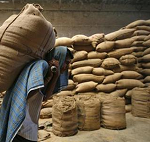India’s decision to block the Trade Facilitation Agreement at the World Trade Organisation in July was perplexing; the confusion was compounded because India was almost alone in its position. The decision was criticised globally, and the country’s lack of communications did not help matters.
Retrospectively, India’s decision appears to be justified. Rich countries were trying to push through the TFA at the expense of issues—such as food security—that are important for developing countries and other poor nations. But India must also take numerous corrective actions, which includes reforming its leaky and inefficient food procurement and subsidy systems.
This policy perspective explains the reasons for India’s curious stand.
Summary
India refused to sign the Trade Facilitation Agreement (TFA) at the World Trade Organisation’s (WTO) General Council meeting in Geneva on 31 July 2014. Since the WTO works through consensus, the meeting collapsed without any agreement. India’s stand was harshly criticised across the world.
Global disapproval of India’s action was heightened especially because the TFA was a part of the Bali Declaration, to which India is a signatory. The Bali Declaration of December 2013 was the first agreement reached as part of the 12-year-long Doha Round of trade negotiations.
However, only the TFA was picked out from the original Doha package while all the other components of the ‘Doha Development Agenda’—such as agriculture, cotton trade, and market access for agricultural products, among other issues—were deferred.
Also on the back-burner was a decision on how much public stockpiling of food grains (considered by the WTO as a trade-distorting measure) will be allowed to developing countries such as India for meeting their food security requirements. Called the ‘Peace Clause’, it essentially insulates countries from being challenged till a permanent solution is found by 2017. However, analysts writing on the Bali outcome claimed that the U.S. Trade Representative at the Bali ministerial insisted on adding riders in exchange for agreeing to the clause.
After Bali, the ‘Peace Clause’ promise was soon forgotten. Most of the WTO meetings prior to July were focused on expediting the TFA, without paying much attention to seeking a permanent solution to agricultural and other pending issues. Even WTO’s printed work programme was loaded in favour of the TFA. Commerce Minister Nirmala Sitharaman’s statement to Parliament confirms this. It led India to believe that developed countries were only interested in getting the TFA signed, and subsequently they were likely to abandon the Doha Round.
India insisted that it was not opposed to the TFA per se, but wanted WTO members to also keep their promise of discussing a permanent solution to food security issues. In fact, India has already implemented many of the TFA’s requirements.
India is also insisting that the WTO must change its method of calculating government support to farmers. The WTO is using the average global food grain prices of the 1986-88 period as the external price benchmark. India’s contention is that prices have risen seven-fold since then. And during 1986-88, the U.S. and Europe were dumping food grains on the world market, leading to a fall in the price of rice and wheat. This makes the benchmark doubly suspect.
India is also contending that the entire system of food procurement through the payment of a minimum support price to farmers is focused on the domestic market and, therefore, cannot be considered as “trade distorting.”
Finally, New Delhi found itself isolated at Geneva with even traditional supporters among developing and poor countries crossing the floor on the TFA. India will have to introspect on the proximate causes for this isolation, including a review of its communication policy. It is likely that the country was overly focusing on food stockpiling at the expense of other development issues, giving its allies reason to feel that it too was interested in a single-point agenda.
India will have to adapt a three-point strategy to not only counter the global tide of bad publicity but also as a bargaining chip for allowing the TFA. One, improve the training schedule of its trade negotiators. Two, push for a change in the external benchmark of 1986-88. Three, bring back the issue of freer cross-border movement of professionals back to the trade agenda.
You can download the PDF version of this Policy Perspective, here.
Rajrishi Singhal is Senior Geoeconomics Fellow, Gateway House.
For interview requests with the author, or for permission to republish, please contact outreach@gatewayhouse.in.
© Copyright 2014 Gateway House: Indian Council on Global Relations. All rights reserved. Any unauthorized copying or reproduction is strictly prohibited


